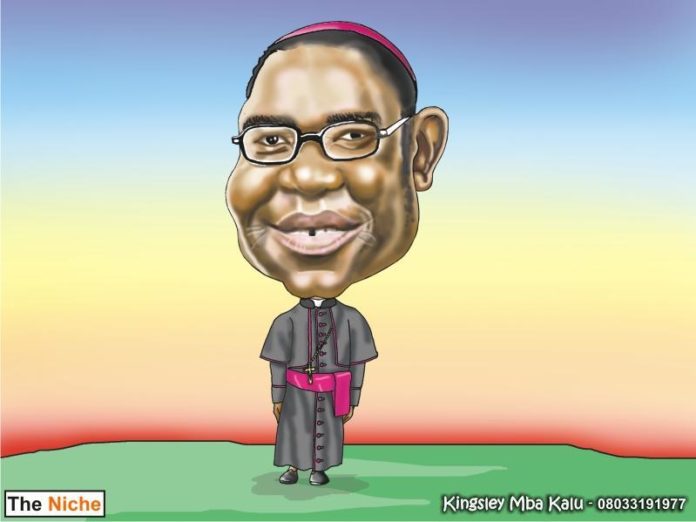By Ishaya Ibrahim
For many, Bishop Mathew Hassan Kukah combines the attributes of scholarship and pastoral calling, making him a man of wit and courage, the ideal philosopher priest.
Kukah is an orator, a writer, a communicator who has the rare ability to be understood by the knowledgeable and the ill-informed, the laity and the priest, the teacher and the learner.
He speaks bluntly, and frankly. That has earned him many friends, and foes alike. But one thing even his critics seemed to concede about the Bishop is that he cannot be ignored.
Kukah was born on August 31, 1952, in Anchuna, a village in the Southern Kaduna area of Kaduna state.
Southern Kaduna has been an area believed to be politically disadvantaged from the rest of Kaduna state. Only one son of the area, late Patrick Yakowa, has been governor in the 53 years the state has existed as a federating unit. He was less than two years in the office before he died.
Kukah’s place of birth may have a compelling impact on his life. Southern Kaduna where he is from has experienced many ethnic and religious crises. Kukah has worked hard to broker peace between the warring ethnic and religious communities without much luck. This may explain his outspokenness against any government whose actions seemed to ignore Nigeria’s religious and ethnic fault lines.
After Boko Haram released a video on December 26 showing the beheading of 10 men believed to be Christians, Kukah called out the Nigerian government, comparing it to Boko Haram.
“Boko Haram uses bomb. They (Nigerian government) are using the levers of power to secure the supremacy of Islam, which then gives more weight to the idea that it can be achieved by violence.
“They have created the conditions to make it possible for Boko Haram to behave the way they are behaving,” Kukah said on January 8, at an event in the United Kingdom.
On February 11, at the funeral mass for the Seminarian killed by Boko Haram, Michael Nnadi, Kukah came harder on President Muhammadu Buhari for allegedly failing in leading the country.
“No one could have imagined that in winning the Presidency, General Buhari would bring nepotism and clannishness into the military and the ancillary Security Agencies, that his government would be marked by supremacist and divisive policies that would push our country to the brink,” he said.
Many have argued that such a blunt description of the president in that light could only be done by a man like Kukah. The consequences could be telling for a person with a lesser credential.
Kukah is a man of knowledge. In seeking knowledge, he must have heeded the counsel of Apostle Paul ( 2 Timothy 2:15) who says to his protege Timothy: “Study to show yourself approved unto God, a workman that needed not to be ashamed, rightly diving the word of truth.
It was in an attempt to be able to divide the word of truth that Kukah was sent to the St Fidelis Primary School, Zagom, St Joseph Minor Seminary, Zaria and St Augustine Major Seminary Jos, Plateau State, where he studied Philosophy and Theology. He became a priest in 1976.
His appetite for knowledge became widened. He pursued different programmes at different universities in Nigeria and abroad.
He obtained a diploma in Religious Studies at the University of Ibadan. He received the Bachelor of Divinity at the Pontifical Urban University, Rome. He bagged a master’s degree in Peace Studies at the University of Bradford, United Kingdom. He earned a PhD from the University of London’s School of Oriental and African Studies. He studied at the University of Oxford in the United Kingdom and Harvard University in the United States.
By 1999 and 2001, many Nigerians were marvelled at the depth of insight a priestly dressed Reverend Father Kukah brought to the Nigerian Investigation Commission of Human Rights Violations, also known as the Oputa Panel.
After that, Kukah has served as a member of many committees set up to either reform Nigeria’s politics, like the National Political Reform Conference of 2005, or to bring peace, like the Ogoni-Shell Reconciliation where he served as chairman.
Kukah, the Catholic Bishop of Sokoto Diocese, has shown to have the courage of Prophet Elijah who told truth to power with a moral authority that compels the rulers to listen.












